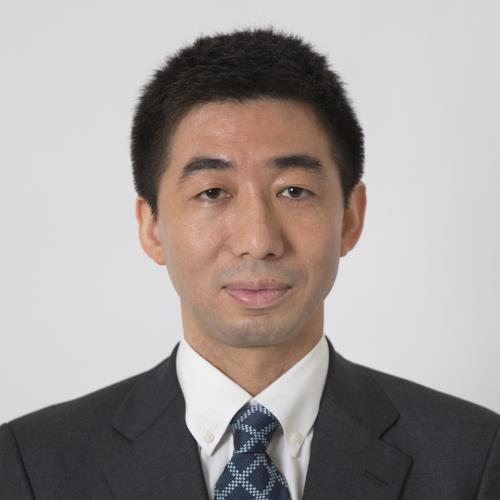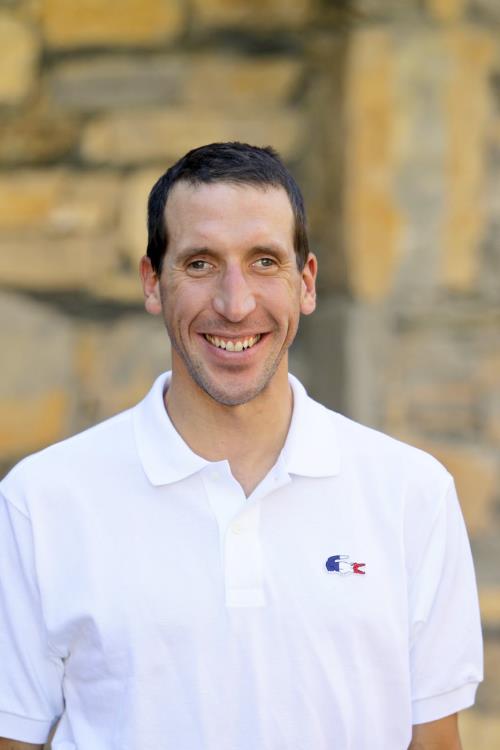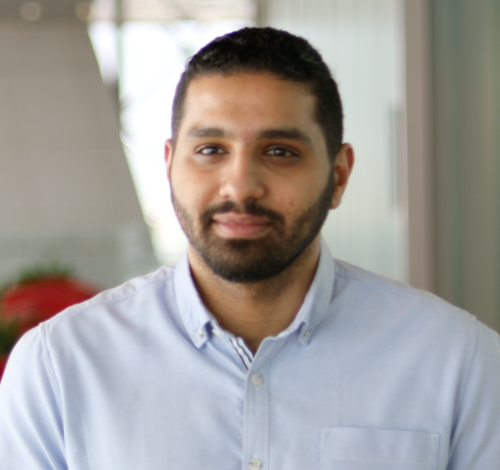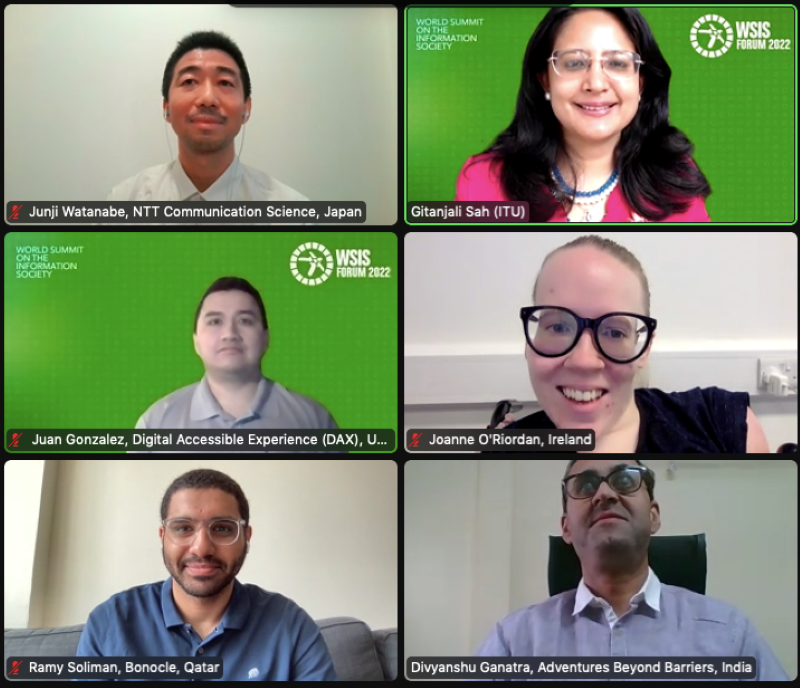Addressing Visual Impairment of Athletes and Sports Fans through New Technologies
WSIS
Session 234
According to the WHO, globally, at least 2.2 billion people have a near or distance vision impairment. Furthermore, it is estimated that blindness affects 39 million people worldwide. In this regard, the number of blind people across the world is set to triple within the next four decades, researchers suggest. In effect, writing in Lancet Global Health, they predict cases will rise to 115 million by 2050.
People with vision impairment can experience many benefits from assisting and participating in sports. These include social inclusions, communication and teamwork, improvement in general health, balance, motor skill acquisition. Such benefits are essential for everyday living. In this regard, every person with a visual impairment has the right to participate (actively or passively) in sports. It is true that there are many hurdles and barriers to overcome in order for them to have the same accessibility as a sighted person in assisting and participating to sports. However, ICTs and emerging technologies can help overcoming these challenges and make sports more inclusive and accessible for everyone.
The session aims at showcasing some of the current and future projects and experiences to address sports athletes and fans visual impairment through ICTs. The sharing of projects, knowledge, and experiences, in effect, is the only way to build a more inclusive and sustainable future, accessible to all.


Junji Watanabe was born on 12th Aug. 1976 in Japan, and received Ph. D. in Information Science and Technology from the University of Tokyo in 2005. He was PRESTO researcher in the research area of "Foundation of technology supporting the creation of digital media content" at Japan Science & Technology Agency from 2005 to 2009. He was a Research Fellow in Japan Society for the Promotion of Science from 2009 to 2011. He started to work at NTT Communication Science Laboratories from 2011.
He conducts research on the mechanisms of human tactile perception, communication, and information transmission from the perspective of human information science. His studies have been presented in international academic journals and conferences, and his works have been also presented in art festivals. He received honorary mentioned at Ars Electronica Prix (2004, and 2011) and Excellence Prize at Japan Media Arts Festival (2008), and was a Jury of Prix Ars Electronica in Interactive Art category (2012). His current interest is to explore methodologies to realize the wellbeing of various people by fostering empathy and trust between people through tactile and bodily sensations. The "Sports Lab with Touch and Connect" was held from 2020 to 2021 to provide an opportunity for children to learn about an inclusive society with visually-impaired para-athlete. The unique feature of this initiative is the use of haptic tools to create an experience of "connection" with others.

Paralympic Champion in relay in 2018
Bronze medallist in Sochi 2014
World Champion in 2015 and 2019
Profession: Physiotherapist
Completely blind, I ski with my guide following the sound of his voice
The guide has a microphone and amplifier on his back so I can locate the origin of the sound

Divyanshu Ganatra is one of the world's leading speakers on leadership, inclusion and innovation. Divyanshu has been covered extensively by some of the world's most popular media—BBC, The Times of India, The Hindu, CNNIBN, CNBC, Star Plus, Condé Nast Traveller, Huffington Post and more.
| India's first blind solo pilot | India's first blind tandem cyclist to cycle from Manali to Khardung La—the highest motorable road in the world | First blind Indian to summit Mount Kilimanjaro in Africa—the tallest freestanding mountain in the world | Touched the lives of over 50 million people across the world | Speaker at leading TedX events | Guest faculty at multiple IITs, IIMs and universities in the US | Inclusion ambassador for governments in India and abroad
Divyanshu lost his eyesight to glaucoma at the age of 19. A severe bout of tuberculosis almost had doctors declare him dead. Divyanshu soon found that his blindness or health struggles were not a problem. It was people's attitudinal barriers and their stereotypes that tried to tell him that he could no longer do what he wanted to do — learn computers or make a career in IT, study psychology and pursue his Masters in Cognitive Neuroscience, or follow his love for adventure and the outdoors. He did not allow the world to decide what he could or could not do. Fast forward to today, Divyanshu continues to shatter stereotypes and prejudices, turning every adversity into an opportunity to emerge as one of India's most successful people in the fields of IT, diversity and inclusion, and behavioural facilitation. His love for sport and the outdoors also led him to found the Adventures Beyond Barriers Foundation (ABBF)—a non profit that promotes inclusion through adventure sports for people with and without disability. Divyanshu today works closely with the leadership of top global companies to help them and their teams push their boundaries, challenge themselves and think beyond the "possible".

Joanne O’Riordan studied criminology in UCC and is only one of seven people in the world living with a rare physical disability known as Total Amelia. This means she was born without all four limbs and even though there is no medical explanation as to why this happened, Joanne or indeed her family has never allowed it to hold her back.
Joanne first gained attention for skipping school to confront then Taoiseach Enda Kenny about his proposed plan to reduce disability funding during his election. In April 2012, she spoke before the UN and challenged the body to create technology to help disabled people such as herself. She was named Young Person of the Year at the People of the Year awards in 2012. Joanne is an activist for people with disabilities, a motivational speaker and a sports columnist with The Irish Times. She appears in the 2013 documentary No Limbs No Limits.
She has used technology to enhance her abilities in both her education and through the wider social environment. She has conquered enormous challenges at home, in school and around her local community. Joanne adapted her life in such a way that it has given her both national and international acclaim. Joanne is now an example to all able bodied and disabled bodies to live very happy, independent, fulfilled lives.
Joanne has challenged the most advanced minds in the world to build her a robot that would become her hands and legs. The challenges she faces everyday get bigger and far greater to overcome. Joanne is an inspiration to others.

Juan Gonzalez, CPACC, is an experienced accessibility specialist and programmer that specializes in accessibility standards such as ADA, WCAG, and Section 508 standards. He is a foundational member of Digital Accessible Experience or DAX Consulting at the nonprofit, The Chicago Lighthouse. DAX is a social enterprise that creates career opportunities for professionals with disabilities in the accessibility and tech industries while helping organizations develop more inclusive digital environments.
Juan collaborates with designers and developers to make sure that not only is compliance built in throughout the development process, but that also the user experience for those with disabilities is considered as well. As a screen reader user himself, he brings firsthand experience to organizations on top of his education and certifications in digital accessibility best practices.
When Juan is not empowering partners to understand and develop digital inclusion, he enjoys spending time competing in sports such as goalball and beep baseball. He has competed in the beep baseball World Series multiple times as a member of the Chicago Comets. He also really enjoys testing out new assistive technology products, especially those that utilize AI, and providing feedback to creators to better enhance the product.

Ramy Soliman is the co-founder and COO of Bonocle. The first-ever braille entertainment platform for the blind.
He started Bonocle alongside some of his colleagues during university. Upon his graduation he chose to delve into carefully selected professional careers to improve his entrepreneurial and leadership skills. He started with project management and then moved into sales. Both of which he considered as learning experiences that will allow him to lead a team successfully at his startup. He continues to self-learn about startups, entrepreneurship, innovation, leadership and creativity and spread his knowledge to startups that seek his guidance. He has also gotten into the role of a creative director helping startups amongst his own and other entrepreneurs create experiences that their customers want.
His most recent created experiences are games for the blind and sighted that focus on tactile feedback and auditory signals.
At Bonocle our focus is to not just to add on to the accessibility of sports events but to provide blind users with accessible sports experiences that they can enjoy from the comfort of their homes.
-
 C1. The role of governments and all stakeholders in the promotion of ICTs for development
C1. The role of governments and all stakeholders in the promotion of ICTs for development
-
 C3. Access to information and knowledge
C3. Access to information and knowledge
-
 C5. Building confidence and security in use of ICTs
C5. Building confidence and security in use of ICTs
-
 C6. Enabling environment
C6. Enabling environment
-
 C10. Ethical dimensions of the Information Society
C10. Ethical dimensions of the Information Society
-
 C11. International and regional cooperation
C11. International and regional cooperation
-
 Goal 3: Ensure healthy lives and promote well-being for all
Goal 3: Ensure healthy lives and promote well-being for all
-
 Goal 4: Ensure inclusive and equitable quality education and promote lifelong learning opportunities for all
Goal 4: Ensure inclusive and equitable quality education and promote lifelong learning opportunities for all
-
 Goal 8: Promote inclusive and sustainable economic growth, employment and decent work for all
Goal 8: Promote inclusive and sustainable economic growth, employment and decent work for all
-
 Goal 10: Reduce inequality within and among countries
Goal 10: Reduce inequality within and among countries
-
 Goal 16: Promote just, peaceful and inclusive societies
Goal 16: Promote just, peaceful and inclusive societies
-
 Goal 17: Revitalize the global partnership for sustainable development
Goal 17: Revitalize the global partnership for sustainable development








